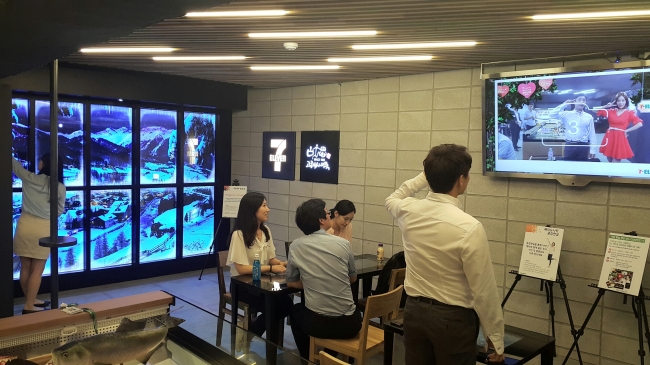 |
Customers try out an augmented reality system at 7-Eleven’s “Creative Economy store” in Myeong-dong, Seoul.(Korea Seven) |
With convenience stores proliferating on every street corner in Korea, the industry’s major players are stepping up their technological convergence and innovation to expand services and boost sales in an increasingly saturated market.
From mobile-based delivery services to augmented reality, convenience store chains are adopting new information technology to improve customer experience from inside out.
“Convenience stores are no longer a place just to buy goods. It’s a space deeply involved with people’s life,” Kim Yong-hwan, a spokesperson at Korea Seven, the operator of the country’s major chain 7-Eleven.
“In that sense, they need to be prompt in dealing with the changes and quickly pick up consumers’ demand including the new trend for convergence of IT,” he said.
7-Eleven, which operates under Lotte group in Korea, opened a store, dubbed a “Creative Economy store,” with augmented reality gears in the Myeong-dong shopping district in Seoul on July 24.
In partnership with SK Telecom, the convenience store chain built a space that merges real-world images with computer-generated virtual objects as part of efforts to woo more customers.
When a customer sits at a table, a 65-inch screen with a camera in the location shows the person in a 3-D virtual space and sends a screenshot to the customer’s smartphone.
Also, interactive touch screens embedded in the store’s tables allow users to play games and surf the Web while enjoying lunch or snacks.
Stiff competition in the market has led to such technology-focused initiatives.
According to the Korea Association of Convenience Stores, the number of convenience stores in the country has surged over 130 percent to 28,000 this year from 12,000 in 2009.
Major players, including CU, GS25, 7-Eleven and Ministop, are leading the industry in terms of market share.
CU, operated by BGF Retail, is focusing on implementing an omnichannel strategy, which integrates all transaction channels including off-line, online and mobile channels.
Currently, the retail chain provides a delivery service to customers who make orders through the website or a mobile application.
CU’s technology locates the store closest to the customer, and if the store doesn’t have the item in stock, it automatically sends the order to another outlet to make sure the customers get what they want in under 40 minutes.
The online-to-off-line service is expected to increase our sales as it expands customer base and provides more convenient ways of shopping,” said Yang Jae-suk who leads CU’s omnichannel task force team.
Ministop Korea has launched its “beacon service,” a smartphone communication technology that transmits messages or prompts directly to its customers’ smart gadgets. Through the cutting-edge tech, people who walk within a 30-meter radius of the store can automatically receive discount coupons.
“It is becoming a big trend to adopt omnichannel services in the retail industry. Starting with the beacon service, Ministop plans to offer various events that combine IT for new shopping experiences,” said Song Ji-il, the company’s marketing manager.
By Park Han-na (
hnpark@heraldcorp.com)







![[Today’s K-pop] Blackpink’s Jennie, Lisa invited to Coachella as solo acts](http://res.heraldm.com/phpwas/restmb_idxmake.php?idx=644&simg=/content/image/2024/11/21/20241121050099_0.jpg)
